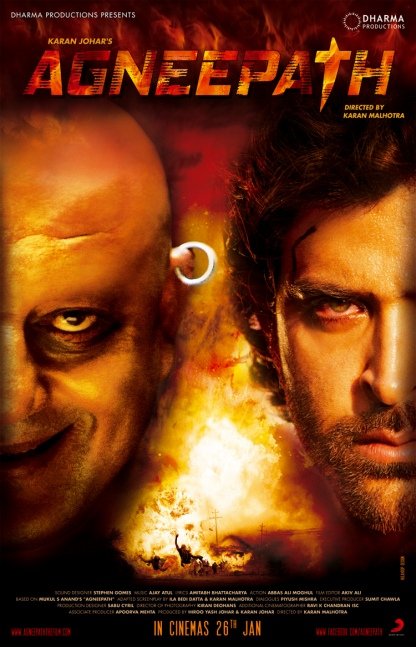




Directed by Karan Malhotra. Starring Hrithik Roshan, Sanjay Dutt, Priyanka Chopra, Rishi Kapoor, Zareena Wahab, Arish Bhiwandiwala, Chetan Pandit, Om Puri.
Agneepath has a strange schizoid quality. It is riveting in parts and plain wearisome in others.
The reworked version of Agneepath is a product of a filmmaking team caught in two minds. The dilemma seems to be whether to make an uncompromising contemporary film or a massy B.O. friendly 80s action kitsch. This lack of clarity results in a film that raises hopes only to dash them. Agneepath does leave an impact, mind you, a very powerful impact. But it also leaves an aftertaste of ‘Damn! If only…’
The basic premise of the film remains the same as the original. Master Dinanath Chauhan (Chetan Pandit), the idealist social reformer on the island village of Mandwa is framed and killed by local landlord’s son Kancha Cheena (Sanjay Dutt). The teacher’s petulant son Vijay (Arish Bhiwandiwala/Hrithik Roshan) swears revenge and goes about extracting it. Taking this premise, debutante director Karan Malhotra and co-writer Ila Bedi Datta have chalked their own trajectory in crafting homage to the original. And it is here that the double vision of this film is evident. The focus is on Vijay’s rise through the ranks of Mumbai underworld to become powerful enough to take on Kancha Cheena. Towards this end, we have the addition of Rauf Lala (Rishi Kapoor), a local smuggler who rises to rule the Mumbai underworld. A young Vijay joins Lala and plots his way to the top, his eyes set on reclaiming his father’s honour and bringing down Kancha Cheena.
The first act is dedicated to the story of Master Dinanath and Vijay’s arrival in Mumbai and it is crafted and shot masterfully. The relationship between the teacher and his petulant son (a commanding performance by young Arif Bhiwandiwala) is heartwarming and the sequence in which the reformer is framed and killed is gutwrenching and shudderingly dark. One of the most anticipated aspects of the film – Sanjay Dutt’s Kancha Cheena – succeeds in making a powerful cinematic impact. The writers have taken the efforts to give him a credible back-story, and his look is effectively diabolic. Unfortunately, Sanjay Dutt ends up making a hash of the efforts by forgetting restraint. The looks and posturing are ruined every time he opens his mouth. It is evident that the Kancha Cheena created by the writers on paper is much bigger than the actor’s histrionic prowess. Part of the fault lies with the lines (this film deserved a much better set of dialogue). Where Kancha Cheena fails, Rishi Kapoor’s Rauf Lala hits the mark. The Mr. Goody-Two-Shoes of Bollywood transforms into pure evil and delivers a masterful performance as the kohl-eyed human-trafficker/drug lord.
Which brings us to the best part of the film – Vijay Dinanath Chauhan. Hrithik Roshan rises to the challenge and how! Aware of the huge expectations, Hrithik shrugs off all the trappings of Big B’s legacy and creates a truly different Vijay, inside out. The smug confidence of Amitabh Bachchan’s character is replaced with vulnerability and self-doubt. Hrithik’s recreation of Vijay is one of the most powerful and poignant performances in recent times. On the flip side, the makers have done away with the Krishnan Iyer M.A. character (played so affably by Mithunda in the original) robbing the film off all its humour and leaving a huge void. The character of the caring, no-nonsense nurse Mary who also served as Vijay’s romantic interest (played by Madhavi) is replaced with the ebullient Kaali (Priyanka Chopra). While the romantic track in the original served as a perfect foil for the distant cold central character, in this case, it is just a forced burden. While Priyanka Chopra shines in the few scenes she gets, it does not add anything to the narrative. Vijay’s relationship with his sister Shiksha in this version serves as another key peg. And it is in these moments that we get to see Hrithik deliver with heartwarming sincerity.
On the technical front, the background score plays a supporting role and is appropriately 80s – loud, jangly but effective. The screenplay has loopholes aplenty, but the efforts taken by Malhotra and Bedi are commendable. The dialogue writing is plain lazy and this lets the film down hugely. The cinematography and editing in the Mandwa sequences and the Ganesh visarjan sequence elevate the urgency and grittiness of the proceedings. The film does seem a tad too long due to unnecessary songs and burdensome romantic interludes and could have done with some trimming in those departments. But then, a reunion song with sister, OTT villain, stupid over-exposition (terrible turn from Om Puri) are staples of an 80s flick. So what if the action scenes are gruesomely today’s. It is this two-mindedness that ends up spoiling what could have been a great cinematic experience. The 1990 original, irrespective of its reception at the box-office had a distinct FTW sangfroid. The Dharma team had an opportunity to create what could have been an exemplary adaptation but it ends up being a mish mash of conflicting sensibilities and confused vision.
- Agneepath poster
- A dash of revenge
- Washed out
- An evil turn
- Enter Sandman









0
comments